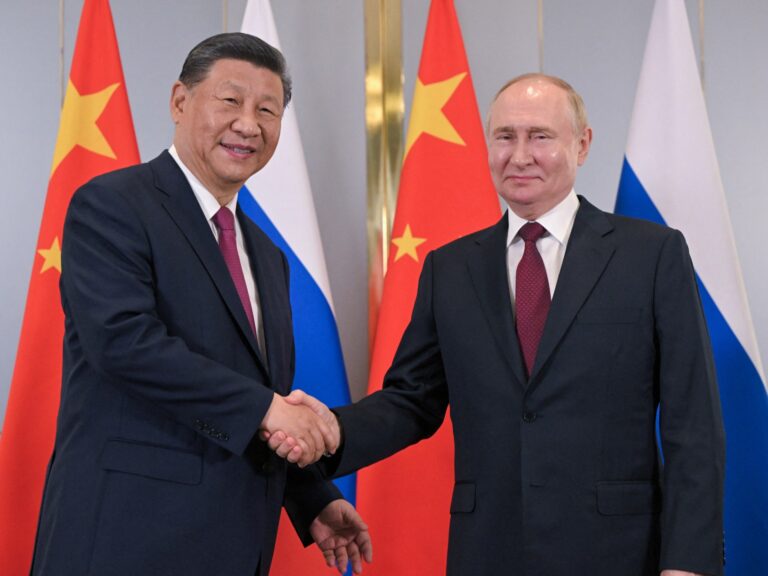The two men founded the Central Asia Security Summit to counter Western powers and have strengthened ties since Russia’s 2022 invasion of Ukraine.
Russian President Vladimir Putin and his Chinese counterpart Xi Jinping hailed their “partnership” at the Shanghai Cooperation Organisation, a regional security alliance set up by the two countries to counter Western powers.
Speaking on the sidelines of a summit in Astana, Kazakhstan, Putin and Xi on Wednesday hailed the group’s expansion of membership to include Central Asian countries, India, Iran and next-generation member Belarus. They also continued to assert that China-Russia relations are a stabilizing factor in turbulent times.
Putin said the SCO was “strengthening its role as one of the key pillars of a fair multipolar world order,” but he insisted that “cooperation is not targeting anyone, we are not creating any blocs or alliances, we are simply acting in the interests of our people.”
Speaking in a televised address ahead of a bilateral meeting with Xi, the Russian leader quickly turned to ties between Moscow and Beijing, saying the two countries’ “comprehensive partnership and strategic cooperation is at its best period in history.”
Meanwhile, citing the “unstable international situation and external environment,” Xi said Russia and China “should remain committed to their original aspirations to build friendly relations for generations to come.”
He also called Putin an “old friend” and said the two countries had made “plans and preparations for the further development of bilateral relations.”
The two leaders’ second meeting in two months comes as both China and Russia continue to face pressure from the West over their regional policies. At their last meeting in Beijing, the two leaders pledged to deepen ties but implicitly criticized international organizations and blocs such as the United Nations, the G20 and the North Atlantic Trade Organization (NATO).
The two leaders have met about 40 times in total, including in an “open-ended” strategic partnership they signed just days before Russia invaded Ukraine in 2022.
China has faced repeated criticism from the United States and Western allies over its growing assertiveness in the Asia-Pacific region and its policies toward Taiwan, which it claims as its own territory.
As Russia continues its invasion of Ukraine, despite facing a barrage of sanctions and pressure from the West, it has sought to show it is not alone on the international stage.
Shared Optics
During the summit, Putin also met with Turkish President Recep Tayyip Erdogan, who was one of the observer states at the summit along with Saudi Arabia and Egypt. Turkey is a NATO member that has close trade and financial ties with Moscow and has signaled its potential as a mediator in the Russia-Ukraine war.
According to the Turkish presidency, Erdogan told Putin that Turkey “can lay the groundwork for an agreement to end the ongoing war between Russia and Ukraine with first a ceasefire and then peace.”
“A just peace that satisfies both sides is possible,” he added.
Belarus, a close ally of Russia and where Russia carried out part of its invasion of Ukraine, is also due to formally join the SCO on Thursday.
Belarusian President Alexander Lukashenko said in an interview with Kazakhstan state media that the group had “showed the world that there is an alternative international platform, a different centre of power.”
But since the SCO was founded in 2002, many of its member states’ interests have remained stubbornly divergent.
Moscow and Beijing have been competing for influence in Central Asia, which includes the former Soviet republics of Kazakhstan, Kyrgyzstan, Tajikistan, Turkmenistan and Uzbekistan. Turkmenistan is the only one that is not a member of the SCO.
Despite decades of Russian influence, the resource-rich region remains key to Beijing’s major economic and trade projects, including its flagship Belt and Road infrastructure initiative aimed at bolstering global trade routes to China.
Nigel Gould-Davis, senior fellow for Russia and Eurasia at the International Institute for Strategic Studies in London, told The Associated Press that the SCO has “significant security differences between its member states”.
But he said the organisation’s “main value” was its view of uniting non-Western countries.

